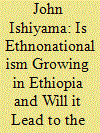| Srl | Item |
| 1 |
ID:
169778


|
|
|
|
|
| Summary/Abstract |
ON 15 FEBRUARY 2018, HAILEMARIAM DESALEGN, Ethiopia’s beleaguered prime minister, resigned. Bowing to pressure from within his own party,1 the Ethiopian People’s Revolutionary Democratic Front (EPRDF), Hailemariam declared that he hoped to facilitate an end to ‘unrest and political crisis’ in the country by leaving the national stage.2 If Hailemariam’s departure had taken observers by surprise, however, what was to follow would defy all predictions. His successor, Abiy Ahmed—whose elevation was unanticipated even by many within the EPRDF Politburo itself3—has, since his April 2018 inauguration, presided over a dramatic set of iconoclastic policy shifts. Perhaps most high profile amongst these has been the securing of a rapprochement with Eritrea, Ethiopia’s most bitter regional nemesis since the outbreak of a border war in May 1998.
|
|
|
|
|
|
|
|
|
|
|
|
|
|
|
|
| 2 |
ID:
180215


|
|
|
|
|
| Summary/Abstract |
In this paper, I examine whether ethnopolitical identities have grown in Ethiopia since the introduction of Prime Minister Abiy Ahmed’s reforms in 2018, using the most recent Ethiopian survey data from the World Values Survey (wave 5, from 2007 and wave 7, from 2020). I find that although there remains a general popular commitment to a national (Ethiopian) identity, among younger people (especially males) there is a growing sense of an “ethnic” identity and a growing intolerance of other ethnic groups. Further, I find that those who express ethnonational identities are significantly more likely to engage in protest and demonstrations. In conclusion, I suggest that this may not portend well for the future of Ethiopian unity. I also suggest that whether this happens also depends on the institutional transformation of the Prosperity Party (the successor the Ethiopian People’s Revolutionary Democratic Front (EPRDF)) and the level of external support the regime receives from its foreign benefactors.
|
|
|
|
|
|
|
|
|
|
|
|
|
|
|
|